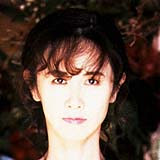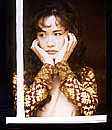Profile
 Miyuki NAKAJIMA
Miyuki NAKAJIMA is one of the best known and the most popular Japanese singer song-writers. She has enthusiastic fans not only in Japan but also in many other countries, in particular in Asia. For instance, she is the most popular Japanese singer in Hong Kong for a long time. Within Japan, there are of course many web pages on her (unfortunately only in Japanese as far as I know).
Though I have no special personal information about her, I love her songs so much that I have enough reason to write an essay on her songs -- the songs which form an indispensable part of my life.
Miyuki NAKAJIMA was born on February 23 1952 in Sapporo. While she was in the high school, she started singing folk songs of
PPM or
Joan Baez in the public and writing her own songs. Her debut was in 1975. I got a cassette of her first album as a present from a friend when I returned to Japan in 1978 and I immediately fell in love with her songs.
At the time she was writing songs of lost love or unfortunate life with incredibly delicate and insightful texts.
I think she belongs to the group of the post 60s singers, who sang private and everyday life filled with sorrow and love. I say "
post 60s" instead of "
70s", because those singers, and usually also song writers, such as
Yosui INOUE and
Kosetsu MINAMI (who are still very active in the Japanese music scene), presented in actuality the antithesis to the excessively politicized and violent 60s.
(*)
- (*)
- Miyuki NAKAJIMA wrote when she was 18 years old "Does everybody want the happiness of all ? I suspect whether people try to build solidarity with others only when it serves their own interests. However, I cannot believe that the ideology, which cannot allow difference of opinions, can make people happy. Then, the only way for us to become happy is to believe the heart of others". This pessimism, which she felt as a teen-age girl, could not but have a strong influence on her later musical creation.
After her debut Miyuki NAKAJIMA created sentimental songs one after another. She sang herself as well as wrote songs for many other singers. In the 80s her songs gained somewhat stronger characteristics and critical tones to the contemporary social scene. In the 90s her songs reflect further the change of the musical and social environment and some of her songs made for the TV dramas and commercials are ranked high on the hit chart.
Texts of her songs
The changes of her music style are partly due to the change of general musical culture in Japan. They also certainly go along with her own changes. Though her recent songs are also popular and attractive, my favorite songs still remain to be her works in the 70s and the early 80s. "
Sayonara wo tsutaete" (convey good-bye), "
Kono sora wo tobetara" (if I could fly in this air), "
Tsuki no akanboh" (moon baby) and other songs make me feel youthful purity and fragility which I cannot perceive from her later works. I would summarize here the texts of some favorite songs.
"Sayonara wo tsutaete" (200kb.rm)
"Kono sora wo tobetara"
How long have you been thinking to fly in the air ?
How long have you been thinking that he might suddenly come back ?
Even though you were knocked down on the ground, you would nstill dream to fly.
Likewise, you cannot stop believing him, even though he coldly refuses you.
Yes, we all might have been birds long time ago. I cannot forget the sky.
I believe, everything will be back once I can fly in the air.
"Tsuki no akanboh"
In the night I hear somebody crying outside.
It's the moon - the baby. It fears loneliness.
If you say you don't fear, you are not a child anymore.
Every child becomes adult without knowing it.
Every child learns sneaky tricks of adults without knowing it.
If you say you don't fear, you are not a child anymore.
Homage
I love not only the music of Miyuki NAKAJIMA but also the text. The songs in their entirety appeal to my emotion. Whenever I have trouble or misfortune, her songs sound so soft and tender and console my damaged soul. Though I like European classical music such as Schubert or Mozart, and their music has many times relieved me from suffering, there is a fundamental difference.
In case of classical music, the music is abstract like transparent crystal and it pulls me up to the place where I feel myself somewhat purified. I can forget the suffering as worthless. On the other hand, Miyuki NAKAJIMA's songs descend to me down in the distress of daily life. It's like a conversation with a most intimate friend. There is no way out from the misfortune, but I can live with the misfortune if the songs accompany me. Misfortune does not have bitter taste any more but it becomes a sweet poison.
I think it is quite usual that one associates certain memory to certain music. Miyuki NAKAJIMA's songs, especially the early works, remind me of many fragmentary scenes from my school days in my home town and I always become very sentimental.
Despite of the pessimistic or romantic underlying tone flowing in her songs, Miyuki NAKAJIMA is a very talkative and humorous person, so far as I hear.

She became a radio jockey at an early stage of her careers and her talks attracted many fans. She still works as a personality at a radio program which features her talks and music. If you have developed her image from her songs as gloomy woman, you are probably very surprised to discover how energetic and jocular she is. She is also active in producing her own show stages. She wrote nearly 20 hard cover books as well.
Unfortunately, there are few English materials on her. I hope you will have chances to hear her songs which certainly enchant you, in particular when you are unfortunate and need mental caress(^^). After all, music must be heard. Argument cannot bring you even the tiniest pleasure you might have when you actually hear the music.
 Miyuki NAKAJIMA is one of the best known and the most popular Japanese singer song-writers. She has enthusiastic fans not only in Japan but also in many other countries, in particular in Asia. For instance, she is the most popular Japanese singer in Hong Kong for a long time. Within Japan, there are of course many web pages on her (unfortunately only in Japanese as far as I know).
Miyuki NAKAJIMA is one of the best known and the most popular Japanese singer song-writers. She has enthusiastic fans not only in Japan but also in many other countries, in particular in Asia. For instance, she is the most popular Japanese singer in Hong Kong for a long time. Within Japan, there are of course many web pages on her (unfortunately only in Japanese as far as I know).
 She became a radio jockey at an early stage of her careers and her talks attracted many fans. She still works as a personality at a radio program which features her talks and music. If you have developed her image from her songs as gloomy woman, you are probably very surprised to discover how energetic and jocular she is. She is also active in producing her own show stages. She wrote nearly 20 hard cover books as well.
She became a radio jockey at an early stage of her careers and her talks attracted many fans. She still works as a personality at a radio program which features her talks and music. If you have developed her image from her songs as gloomy woman, you are probably very surprised to discover how energetic and jocular she is. She is also active in producing her own show stages. She wrote nearly 20 hard cover books as well.